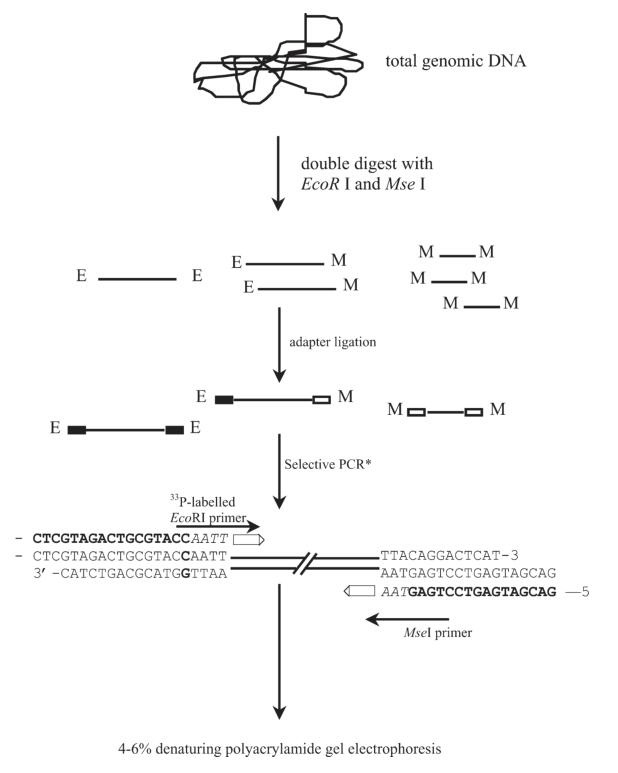Amplified fragment length polymorphism (AFLP) is a DNA polymorphism detection technique developed based on random amplified polymorphic DNA (RAPD) and restriction fragment length polymorphism (RFLP). With the characteristics of high repeatability of RFLP technology and simple & rapid RAPD technology, it is not necessary to prepare probes like RFLP analysis, and the detection of genomic polymorphism like RAPD markers does not need to know the sequence characteristics of the genome and makes up for the poor repeatability of RAPD technology. Compared with other PCR-based marker techniques, AFLP can detect many loci and polymorphic markers at the same time.
 Figure 1. A schematic presentation of the steps in the AFLP process. (Chial H, et al. 2008)
Figure 1. A schematic presentation of the steps in the AFLP process. (Chial H, et al. 2008)
AFLP uses many of the same steps as RFLP, SSR, and RAPD, including restriction enzyme digestion of genomic DNA, PCR, and electrophoretic separation of DNA fragments. However, this method includes additional steps that permit high-resolution interrogation of the entire genome, and it yields highly specific reproducible genotypic data. Although AFLP can only be used to study dominant genetic markers, it does not rely on any previous knowledge of the genome sequence.
In addition to their widespread use in DNA fingerprinting, AFLP-based approaches have also been used to produce gene expression fingerprints. AFLP gene expression fingerprints are generated using cDNA (rather than genomic DNA) as the PCR template. With this approach, researchers can study gene expression from multiple loci as a means of comparison between two different individuals or populations.
Lifeasible provides AFLP technology services for the study of plant genetic diversity, gene expression and regulation, classification and evolution, DNA methylation, construction of the genetic map, and so on. We also provide customers around the world with the following optional research solutions (including but not limited to), which can be freely combined according to the content of the project. Besides, our experts are ready to provide you with customized personalized services.

With its rich experience in plant research, Lifeasible has built a perfect and advanced technology platform by a team of senior experts to provide AFLP technical services to customers around the world.

Lifeasible offers complete, professional AFLP technology service, as well as customized experimental protocols based on your project requirements and plant sample characteristics. For more information, please contact Lifeasible.
Reference: